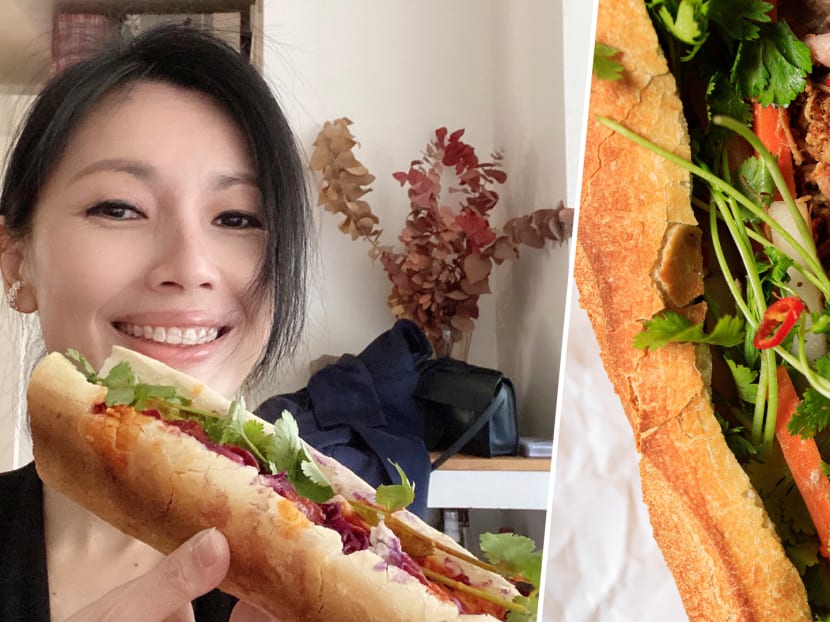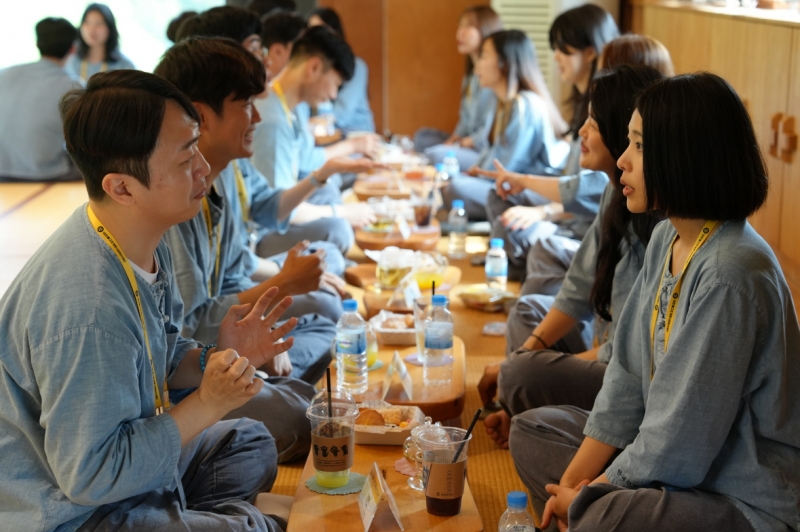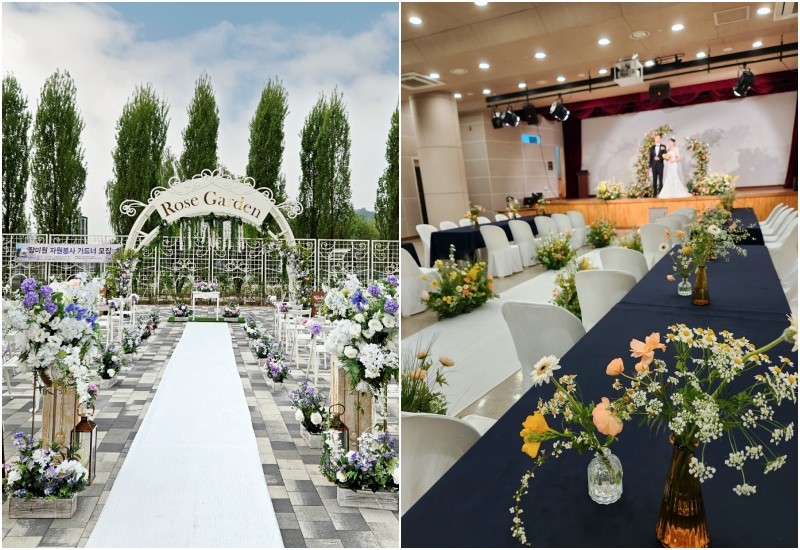I am heading to Korea where I think my expertise is required. Is this regarded as brain drain?
Gov’t provides aid for dating and marriage
Aug 22, 2024
View this article in another language
Participants of the dating program "I am Jeolo” (Temple) talk to each other one-on-one at the Korean Culture Training Institute in Gongju, Chungcheongnam-do Province. The event was held from June 15-16. (Korean Buddhist Foundation for Social Welfare)
By Aisylu Akhmetzianova
People going on blind or ordinary dates can now do so with government support. They can get married in public museums or parks, and pay just KRW 10,000 in rent per month for their new home after marriage. This is not a dream. This is how a new dating and wedding culture is being sponsored by the Korean government.
A 2023 census showed that the total population of Korea (not including foreign nationals) was 49.84 million, down 101,000 (0.2%) from the previous year. It has declined every year since 2021. Last year's total birthrate was 0.72, marking a new record, as it was lower than the 0.78 in 2022. There were 194,000 marriages last year, a 40% decrease over 10 years.
An increasing number of Koreans are giving up on dating and marriage, causing a demographic cliff. The concurrent low birthrate has been a social problem for some time, which even the president has called a national crisis.
The government has taken measures to resolve this crisis, such as by establishing a ministry to cover population strategy and planning. Local governments and private organizations have also stepped in. They have arranged meetings between single men and women, and come up with various programs and strategies to increase the population. Even Buddhism has joined in.
A man from Dangjin, Chungcheongnam-do Province, and a woman from Gwangak-gu District, Seoul, met for the first time on Aug. 9 and fell in love. They met each other through a program called "I am Jeolo" run by the Korean Buddhist Foundation for Social Welfare. Jeol means "temple" in Korean. The program is named after the dating reality show "I am Solo."
The program combines a temple stay with blind dates. It offers opportunities for a rendezvous between single men and women in their 20s and 30s. Participants stay for one night and two days in a temple, engage in various programs to become acquainted with one another, and perhaps find a partner.
This year's fifth edition was held from Aug. 9-10, for which a total of 1,510 people applied, marking a record-high competition rate of 70:1.
Out of the final 10 pairs of men and women, six ended up becoming romantic partners. For its contribution to solving the low birthrate, "I am Jeolo" received a presidential award on Aug. 11 at an event to commemorate World Population Day.
Busan City is also actively supporting romantic relationships between young people. It’s Saha-gu District will hold an event called "Day of Unmarried Foreign and Local Men and Women's Meeting" this October. It will screen applications, select participants and arrange blind dates among them.
The government pays KRW 500,000 to pairs who become couples and provides KRW 1 million if they have family meetings to discuss marriage. Not only that, the government will give KRW 20 million in congratulatory money when a couple gets married. If they find a house on jeonse (lump-sum deposit as rent), they can receive a deposit of KRW 30 million. A couple living in a house on wolse, or monthly rent, can receive a monthly supplement of KRW 800,000 for up to five years.
Wedding halls can be used for free at Gwangnaru Rose Park in Hangang River Park in Gangdong-gu District, Seoul (left) and Boramae Safety Experience Center in Dongjak-gu District. (Screen captured from "Seoul My Wedding")
The Seoul Metropolitan Government has opened up 28 public facilities as wedding halls, as those run by the private sector are costly. Wedding halls at 22 venues including the square at the Seoul Museum of History, the Sejong Center for the Performing Arts, Maru Park of the Seoul Water Recycling Corporation, the Seoul Water Recycling Park and Magok Square are free of charge. Six are indoor and the others are outdoor, often preferred by newlyweds. Here, couples can receive support of up to KRW 1 million to spend on the wedding.
After the wedding, couples have to worry about finding a house, but that can be taken care of. Local governments are implementing various programs to provide housing to alleviate the burden that newlyweds shoulder when it comes to finding a home.
From next year, Incheon will provide homes to 1,000 newlywed couples, at a rent of KRW 30,000 a month for six years. Those eligible for the housing are newly married couples who got married within the past seven years, or soon-to-be married couples.
Hwasun-gun County of Jeollanam-do Province is offering homes at a monthly rent of KRW 10,000, for newlywed couples. The county paid jeonse for the apartments, and is renting them to the newlyweds and young people.
Jeollanam-do Province is also planning to provide 1,000 houses for the same monthly rent in regions with declining populations, such as the counties of Goheung-gun, Boseong-gun, Jindo-gun and Shinan-gun.
[email protected]


They have fairer skin, bigger eyes and more importantly bigger titties!





They have fairer skin, bigger eyes and more importantly bigger titties!

